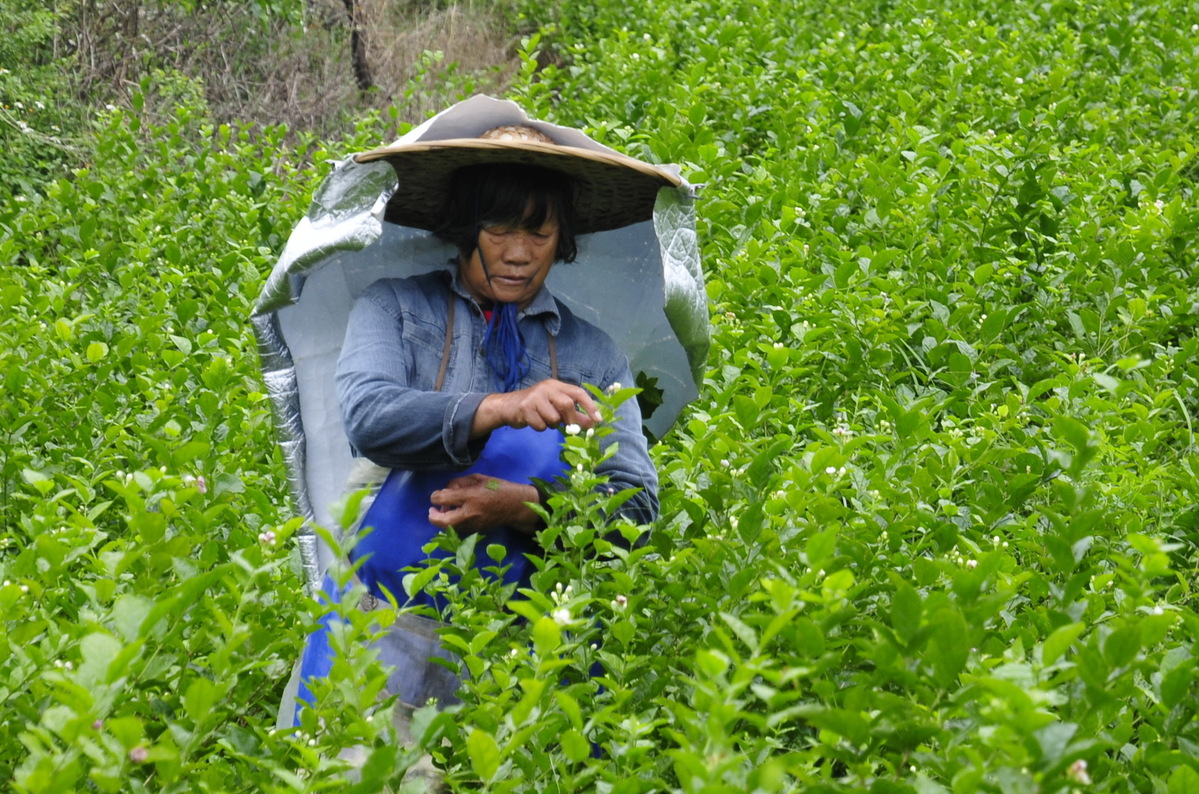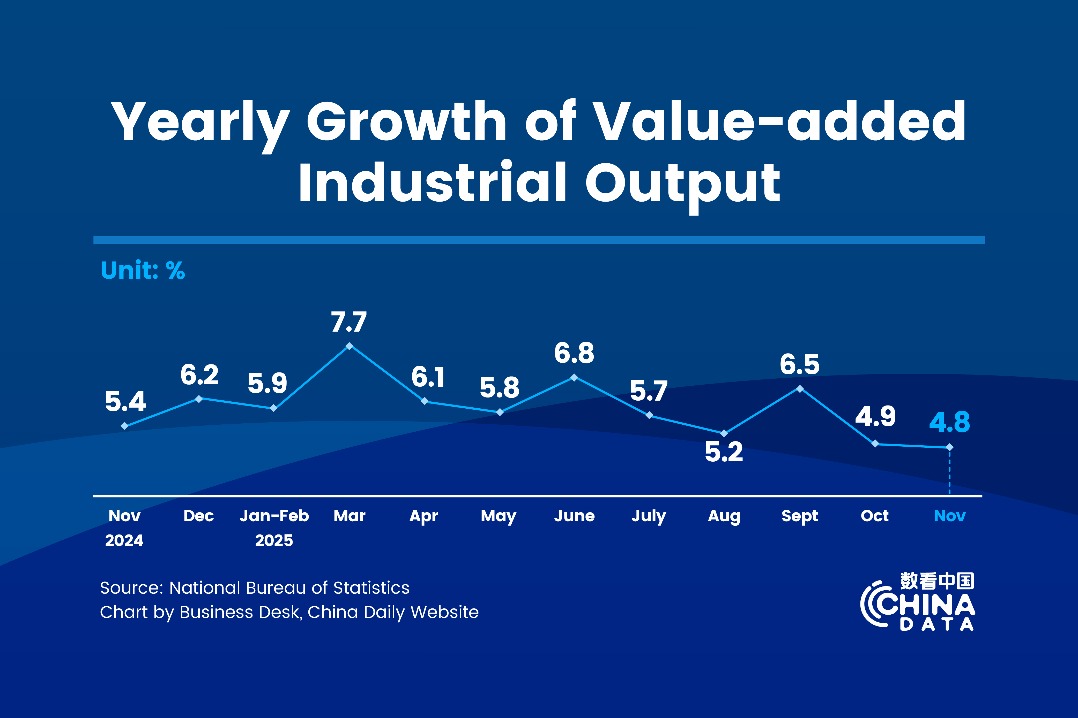Jasmine flower growers find budding prosperity


New markets blossom as customers seek aromatic plant of many uses
Flower grower Wei Caiyu, 47, leans over in a field of jasmine and quickly picks some fragrant flower buds. She is anxious to get on her motorcycle to sell the fresh jasmine in the market before it rains. It's 9:30 am in mid-October and she is heading out for the fourth time - and the price differs each time.
"My waist aches after bending down for a long time, and the sun is hot most of the time. It's tiring work, but the effort is worthwhile because of its profitability," said Wei, from Hengxian county in Nanning, Guangxi Zhuang autonomous region.
Her family owns 0.13 hectares of jasmine bushes that were planted nearly three decades ago. The annual income is about 30,000 yuan ($4,300) from a good harvest, which is about 10 times that of growing grains on the same amount of land.
The jasmine flowering season runs from May to October. Like other local growers, Wei picks flower buds from dawn to dusk during the peak season - from May to August - and does odd jobs in the offseason.
Hengxian started to plant jasmine on a large scale in 1978, when China launched its reform and opening-up policy.
In 2017, the county had 7,000 hectares of jasmine and about 330,000 growers. It produced a total of 85,000 metric tons of jasmine last year.
The county also boasts more than 130 jasmine tea companies, including Beijing brand Zhang Yi Yuan.
"Our jasmine tea industry is mature. The current focus of work is to acquire more added value from jasmine and extend our industrial chain," county head Zeng Pengxin said.
"Jasmine is of great value in skin care and health maintenance, and it's also a medicinal plant. It's an untapped market and we're looking for institutions to do related research."
He believes it's important for government to build Hengxian's jasmine as a brand through good policies. He also noticed that in recent years local jasmine-related products have become more diverse, ranging from skin-care products and snacks to bonsai.
Huang Shanzhen, general manager of Guangxi Shunlai Tea Co, which owns Zhou Shun Lai, a local jasmine tea brand that dates back to 1886, said it's important to keep pace with the era, so she's working hard to develop new products based on jasmine.
"I like the tea business because it makes people healthy. Also, you can do various things related to jasmine," she said.
Huang is planning to launch a milk tea shop next spring in Nanning, selling milk tea made with jasmine.
"Besides our signature jasmine tea, we have to offer new products to target young Chinese. The milk tea market has great potential in China. Drinking it has become a part of the social life of young people, including my 18-year-old daughter," she said.
The company started selling skin-care and fragrance products made with jasmine flowers last year. Its jasmine essence oil is popular.
Huang said there was only jasmine green tea in the past, and now there are other types in the market, such as jasmine black tea and jasmine pu'er tea.
"It's an old brand, but our packages should showcase youthful vigor to attract young customers," she said.
Bi Donghai, 29, is one of the pioneering sellers of jasmine bonsai, an uncommon species in the market. He started his business in 2017 and sold plants at an average price of 350 yuan. His customers are mainly middle-aged and elderly.
Bi, now the Party secretary of Hengxian county's Dong'an village, said flower growers often dig up the jasmine stalks that were planted three decades ago because of their poor nutrition and yield.
He seeks out and buys these wide stalks from growers and spends at least half a year carefully reviving them. When the jasmine stalks are prosperous and blooming again, he will cut them into beautiful shapes and sell them to customers.
He and his team spent a lot of money in 2016 to figure out a way to make the jasmine bonsai.
"It's of artistic value. I'm confident about its potential market," Bi said.
On the other hand, Bi said young people prefer smaller, cheaper, potted jasmine, rather than bonsai, to which value is often added by the artistic factor. They're satisfied that they'll be able to enjoy the fragrance at a cost of about 20 yuan.
His potted jasmine is sold mostly to Beijing, Shanghai, Guangzhou and Zhengzhou.
"In the early years, the locals would sell jasmine seedlings to people from other places. Customers had no idea that the fragrant jasmine originated from our county," he said.
In 2015, residents started to sell potted jasmine. Bi is working hard to ensure the quality of his potted jasmine and to import other species from overseas.
"Many flower growers still plant jasmine in a traditional way. But I'm adopting modern technology such as soilless cultivation, and quality criteria for potted jasmine," Bi said. His company also helped provide jobs to local villagers.
Like local traders and companies, his market relies mainly on e-commerce. In 2015, Hengxian became Guangxi's first model county in Alibaba's Rural Taobao Program.
"While the program focuses on turning rural residents into online shoppers, the government is also working hard to encourage local traders and companies to sell farm products on e-commerce sites by providing subsidies," county head Zeng said.
In past years, the county has established a logistics system with delivery costs much lower than before. It has a network of rural e-commerce service centers covering more than 80 percent of all administrative villages.
"The development of e-commerce not only greatly increases companies' sales but also boosts poverty relief work. For example, the supply of passion fruit in a village falls short of demand online, while in the past nobody wanted to buy any, even at half price," he said.
He said migrant workers are lured to the county because they can earn a decent salary in their hometown without much pressure.




































